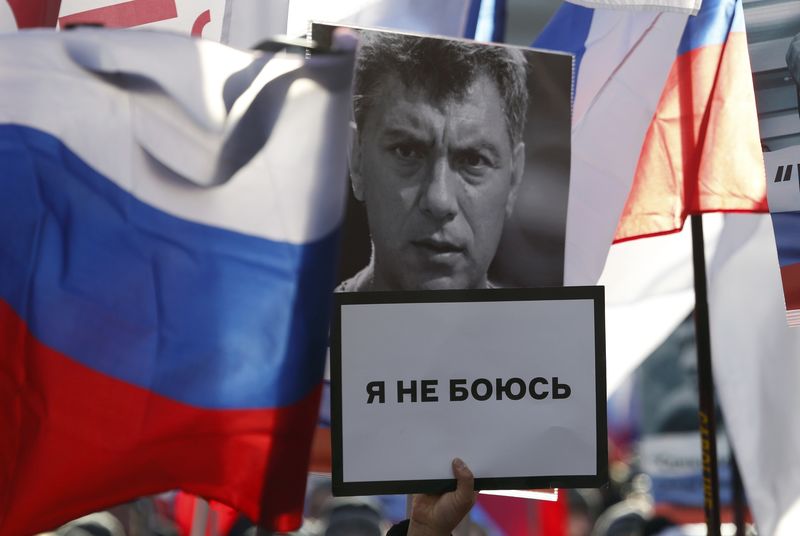By Andrew Osborn
MOSCOW (Reuters) - For more than 700 days and nights, in all weathers, a small group of hardcore anti-Kremlin activists has guarded a makeshift memorial to murdered Putin critic Boris Nemtsov on a bridge opposite Moscow's Red Square (NYSE:SQ).
The temporary shrine, made up of flowers, candles and portraits, is meant as a precursor for a permanent memorial plaque at the site where Nemtsov, a former deputy prime minister, was shot dead in February 2015 in a case that has yet to be solved.
A rallying point for a fragmented opposition, it is often pieced back together by the activists, who have been refused a plaque over a regulation that Putin himself circumvented in a different case in 2013.
Activists say city cleaners have dismantled the shrine almost 30 times, nationalist thugs have assaulted them, and police have detained them over allegations they are disturbing public order.
Now, the authorities have announced plans to close much of the bridge for repairs, depriving the liberal opposition of its most visible political platform.
"The aim of this construction work is simple," said Lyubov Sobol, a prominent opposition campaigner. "To get rid of the people's memorial in front of the Kremlin until, at the very least, the presidential election in 2018, and at best, forever."
The authorities say the work, due to start in May and last 14 months, is urgent and not politically motivated.
They made the same argument in 2010, when they closed a Moscow square, Triumfalnaya Ploshad, that had become the main venue for anti-Putin rallies, saying an underground car park would be built there.
It never was, but the site became an archaeological dig for two years and the square only reopened long after the 2012 presidential election. It has since been landscaped in a way to make protests impossible.
A BATTLE TO CHOOSE HEROES
Visible from Red Square when activists run up a flag there, the shrine to 55-year-old Nemtsov sits on one of the most popular routes for tourists, whose numbers will swell dramatically next year when Russia hosts the World Cup.
The opposition, which is given no air time on state television, is unlikely to field a candidate next year capable of unseating Putin, who enjoys strong ratings.
But for many activists, the memory of Nemtsov -- he helped found the main anti-Kremlin movements -- and the modest shrine, are a source of hope. For the past two years, thousands of people have marched nearby on the anniversary of his death.
"The authorities don't like to be reminded of a person who dedicated his life to fight for democratic values or of a political murder near the Kremlin's walls,” Zhanna Nemtsova, the slain politician's daughter, told Reuters.
“Memory, in modern history, is closely linked to politics."
Five Chechen men are on trial for Nemtsov's murder. Investigators say their motive was purely commercial.
Olga Shorina, a long-standing Nemtsov ally, said the repairs looked like an attempt to erase his memory.
“The authorities have other heroes,” said Shorina.
When a vote to identify the most notable figures in Russian history was last organised by state TV, in 2008, Soviet dictator Josef Stalin came third, reflecting many Russians' respect for strong leadership even if the cost - in human lives - is high.
Public enthusiasm for Nemtsov is lower.
A Levada Centre survey showed this month that 43 percent of those asked opposed a memorial plaque in his honour against just 25 percent in favour. The rest didn't know how to respond.
Some Russians associate Nemtsov with the 1990s, a period of food shortages when he was a deputy prime minister. State television has portrayed him as an irrelevant has-been and Putin's spokesman has said he was "quite an average citizen".
PLAN B
At a March 7 public hearing, Yuri Ivankov, head of Gormost, Moscow's bridge maintenance division, showed pictures of rusty bridge parts he said proved it needed urgent attention.
"A decision has been taken by the Moscow government to repair the bridge ... and we will repair it," Ivankov said.
Kremlin critics note there are no plans to overhaul some of the city’s older bridges, and leading Moscow architect Yevgeny Asse and other specialists say there is no need for major repairs now.
Ivankov, whose department is the one which sends in the cleaners, told activists at the hearing to stop asking him "political questions" about the shrine and try to legalise it instead.
Authorities cite a rule stating 10 years must pass before any memorial can be erected, although in 2013, Putin authorised a Moscow street to be named after Venezuelan leader Hugo Chavez four months after his death.
Ivankov told reporters he would need authorisation from the FSB, the successor to the KGB, the police and the FSO, the agency that protects Putin, to stop clearing away the shrine, described on Gormost's website as a health and safety risk.
Putin said in 2015 he would ask Moscow's mayor to ensure people were allowed to leave tributes. Activists said the clearances became less frequent but continued nonetheless.
Andrei Margulev, one of the shrine’s most tenacious defenders, said activists had a backup plan to set up in another location, which he asked Reuters not to disclose. It would be far less high profile than the political heart of the capital.
"This place is a small island of humanity in a sea of inhumanity. That’s why it’s so precious to us,” he said of the current location.

Olga Lehtonen, a fellow activist, said the authorities could only string out the repairs for so long. “Sooner or later, the work will end and we'll be back.”